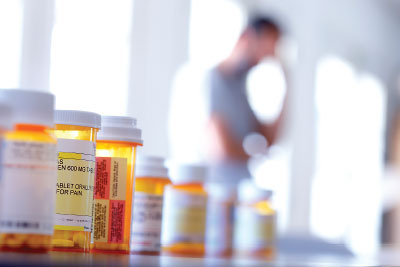The definition of treatment-resistant depression in many ways depends on whom you ask. The Food and Drug Administration defines it as a suboptimal response to two or more antidepressants. The European Medicines Agency defines it in a similar way but states that the medications should be from different classes. Other definitions—of which there are more than a few—vary with respect to the dosing and duration of medications before concluding a patient to have treatment-resistant depression.
That there are so many definitions presents multiple challenges to psychiatrists and other mental health professionals who work with patients with depression, said Roger S. McIntyre, M.D., during a session at APA’s 2023 Annual Meeting in May.
“The wide range of definitions has made it very difficult for us to precisely estimate how common treatment-resistant depression is,” said McIntyre, a professor of psychiatry and pharmacology at the University of Toronto and chair and executive director of the Brain and Cognition Discovery Foundation in Toronto. “It has also made it very difficult for us to suss out the neurobiology [of treatment-resistant depression], identify risk factors, position us for prevention, and create [treatment] algorithms that are evidence based. It no doubt is contributing to heterogeneity in patient outcomes.”
Likewise, variations in the definition of what constitutes response to treatment presents a challenge, McIntyre added.
“Historically, response in major depressive disorder has emphasized a clinician outcome assessment with [the Hamilton Depression Rating Scale, HAM-D] or other major scale score. The benchmark in the field has been a response to therapy that is a 50% greater improvement, and remission has [also] been defined with various scales,” McIntyre said.
McIntyre pointed out a major problem with that.
“Most of these definitions focus on clinician-reported outcomes, with almost none of them focusing on patient-reported outcomes like quality of life and function,” he said.
To illustrate his point, McI ntyre discussed depression in patients over age 65 and the likelihood that they will respond to treatment with selective serotonin reuptake inhibitors (SSRIs). He explained the current thinking that older age correlates with a lower likelihood of responding to SSRIs, which then has led to the assumption that the onset or existence of depression in older age renders a patient more susceptible to treatment-resistant depression.
McIntyre then cited research about loneliness, something that affects many older people and is a known contributor to depression.
“We look at the reasons people don’t benefit from an SSRI, we get carried away with genetics, we talk about [C-reactive protein], we talk about whether or not there are adequate doses and duration [of medications], and it turns out ... that if you have no relationships with anybody, the chances of you responding successfully to treatment are greatly diminished.”
McIntyre said a patient’s level of loneliness may combine with quality of life and function to affect outcome from the patient’s point of view.
“How many of you have seen persons living with depression wherein the depression symptoms are improving, [but] the patient says to you ‘My quality of life isn’t improving. My function isn’t improving. What have you done for me lately?’” he said. “And it’s an excellent question. It [suggests that] maybe the measures clinicians love aren’t capturing the full depression experience.”
He added that if lower quality of life and functional impairment continue to be a concern for the patient even though the clinical symptoms of depression are in remission, there is a much greater likelihood the patient will relapse.
McIntyre also discussed obesity’s role in treatment-resistant depression, focusing on patients who have metabolic abnormalities such as diabetes and pre-diabetes.
“When someone with depression begins to manifest metabolic problems, the biosignature of their depression is changing toward a low-grade, inflammatory, insulin-resistant depression,” he said.
He discussed research involving people with subclinical changes in insulin signaling and depression wherein those with the greatest impairment in insulin signaling were found to be less likely to respond to an antidepressant.
McIntyre rounded out his presentation with a discussion of newer treatments, including dextromethorphan/bupropion (Augelite, approved in 2022 for depression) and lumateperone (Caplyta, approved in 2021 for bipolar I and bipolar II disorder); treatments currently in various stages of research, such as psychedelics; and the potential usefulness of medications approved for nonpsychiatric purposes, such as glucagon-like peptide-1 receptor agonists (GLP-1 agonists), which are used to treat type 2 diabetes and obesity. ■


